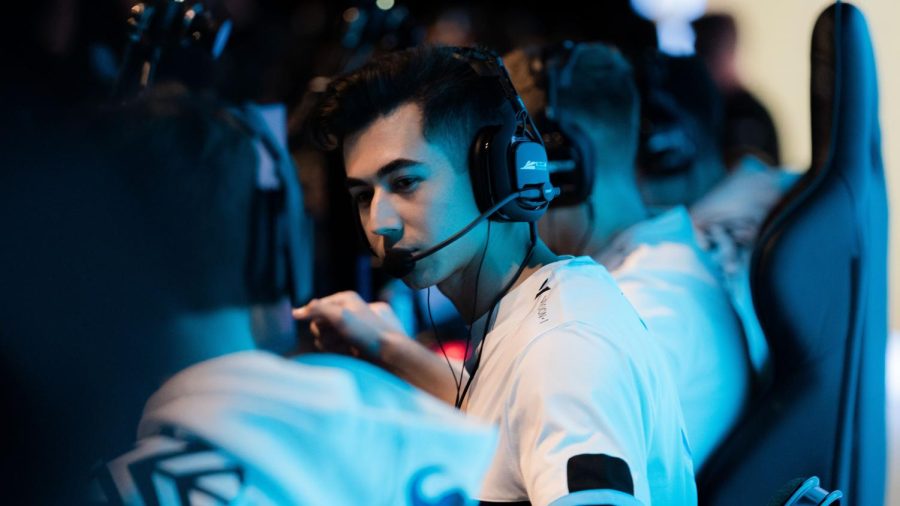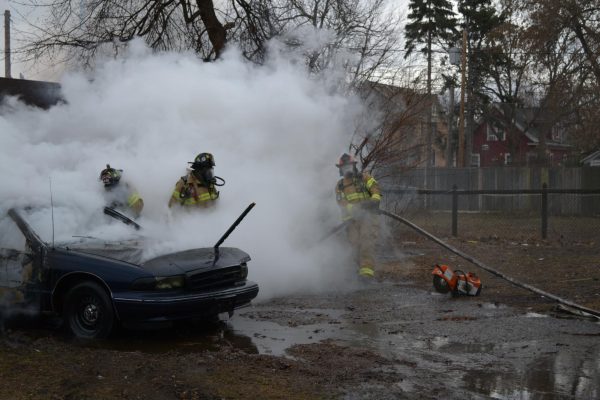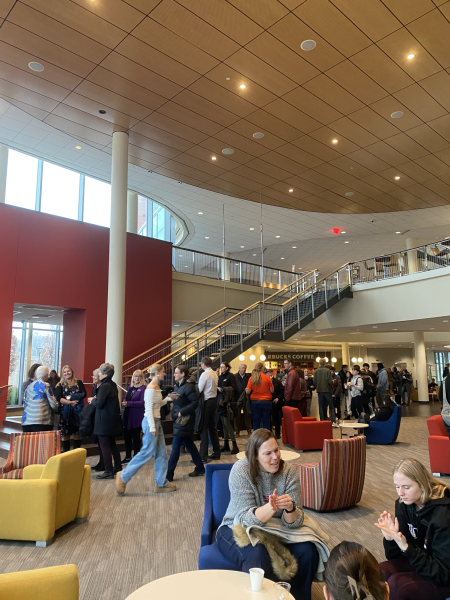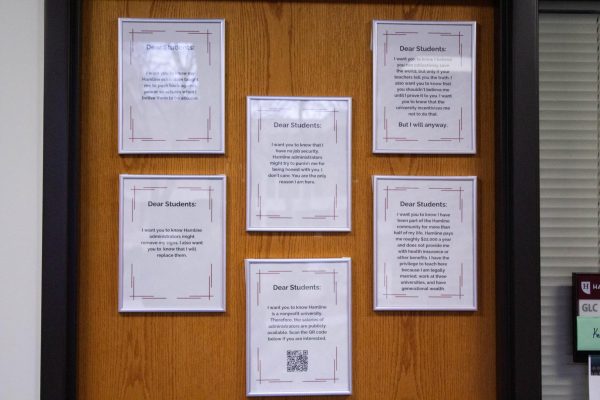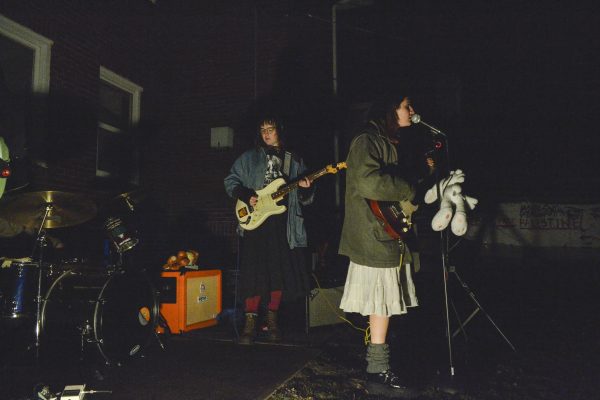Q&A with Dillon “Attach” Price of the Minnesota Røkkr
Hamline’s budding eSports team got the opportunity to meet Attach from the Minnesota Røkkr’s Call of Duty League team and ask some questions about the professional gaming industry.
November 15, 2022
Seniors Jaime Mendez and Korai Kayim-Yanko from Hamline’s eSports team contactedDillon “Attach” Price, Minnesota’s hometown player on the Minnesota Røkkr Call of Duty League team, and he was able to sit down with Mendez and Kayim-Yanko to talk shop about his sport.
Mendez: So my first question is, can you explain what got you into competitive Call of Duty or just competing in video games competitively?
Attach: Yeah, I learned about it at a young age. One of my friends on my baseball team, I went over to his house and played on the Xbox 360 playing COD 4. And then another one of my friends told me about game battles which is where you play against better competition that takes it serious.
When I went on that website, I think it was in fourth or fifth grade or something, there was a live stream and it showed a tournament that was happening in person of, like, two teams on a stage, I think at the time there’s only four to eight teams there, this is in like 2007 or 2008. No crowd or anything, but I was just like, “Oh, that’s so cool.” Like, you could be in person playing a tournament, and it was for money. It wasn’t for a lot of money. I think the grand prize is like $2,000 or something. So they would split it four ways, five ways. And it was just the coolest thing to me, though. So I got really interested.
Mendez: Even now I remember growing up watching Black Ops two and upwards. Just winning money for video games just was astounding to me. So can you tell me what your role is on the Minnesota Røkkr Call of Duty team?
Attach: My role on the Minnesota Røkkr is a main AR player. In Call of Duty you pretty much have two submachine gun players who kind of run in their map all fast and they’ve got two AR players who are kinda looking over them, trying to really give good communication to the rest of the team, and kind of like laying out the game plan because you just see more of what’s going on in the game.
Mendez: Sure, sure. So what is training look like in your day to day, seeing that this has sports in the name so people get confused on what that kind of means.
Attach: Yeah, so with a team you usually practice anywhere from like 12:00 to 5:00 or 6:00, about five, six hours. You’ll take a little break, eat, relax and then get back on and play some more, like individually, and you could work on your own gameplay or you could even watch stuff from recent tournaments or practice versus other teams with your teammates. So you can see what you did wrong here, or what you did really well, what you keep reinforcing good habits for, and there’s not like a certain time you clock-in or clock-out. It’s kind of all-around, 24 hours a day. So at any point you can really work on your own game but you want to find a healthy work life balance, for sure.
Mendez: No, for sure I get that. So seeing that this is your seventh or eighth year competing in Call of Duty, what keeps you motivated?
Attach: The only thing that really keeps me motivated is just the competition. It’s just fun to compete against other people and see where you stack up as a player, as a team, in the world. And we’re all just playing and fighting for, to win that World Championship and all the championships as well, to have that feeling for that day or two of being the best team and the best player in the world is… it’s just something you really can’t explain, that winning moment. So all the hard work and all the hours behind the scenes that we put in is all for those couple of days or a couple of hours to get that feeling. But yeah, the competition is what keeps me in it.
Mendez: All right. So we’ve heard a little bit about the story of Attach. What can you tell me about Dillon Price?
Attach: I don’t know. What do you want to know?
Mendez: I mean, like what do you do? I mean, you live in Minnesota, right?
Attach: Nah, I’m living in Dallas right now.
Mendez: All right. So what do you do for fun?
Attach: What do I do for fun? Okay, so, during the season, I definitely try to get outside a lot because we’re forced to be inside and sitting down and playing. So when I wake up, go to the gym for like an hour. Come back, get ready, start practicing.
After practice, take like an hour off, go for a little walk, get some food, chill. And then on my off time, I might read some books. I meditate a little bit here and there. Go get a massage, sign up for a yoga class, I don’t know. I like to just get outside and be in nature too, so just wherever I’m at I like to go explore. And that’s just what I find interesting outside of gaming.
Mendez: You are one of the more veteran players on the team. And seeing that this is the third, this is the fourth year in the CDO. How does that change your mindset going into each?
Attach: Just being the veteran on the team, you’ve been through a lot of things, from the old days, the new days and still playing, so you see what worked for a lot of players in the past, what didn’t work for a lot of players and what you should be doing.
So you want to try and tell the the newer players on the team, like what they should be doing to really just stay focused on the game, stay focused and improve, and to have a long career like this because we’ve seen players have super long careers, you see players with short careers so you kind of want to give them the game and keep them healthy, while they’re becoming the best players in the game.
Mendez: Do you have any words of advice for students that would like to pursue a career in eSports?
Attach: It could, or it might seem like, being a professional player is the only thing you can do in eSports. But there’s so much more for each organization. There’s videographers, photographers, the marketing team, the people who are planning all the different brand deals and interviews and stuff, it’s not just you need to be a player. There’s so much more, you can be a personal trainer for a team, a chef, a wellness coach, like there’s so much to do.
So if you are passionate about video games and eSports, there’s something for you in eSports. It’s not just you have to play or there’s nothing, like there’s so much more. There’s so many different games. So one you might not like a certain game, but you might love another one. So there’s so many games, so many different people and fan bases around the world, too, who love different games. So it’s a worldwide thing, so you can travel the world if you join a certain team. There’s a lot of opportunity in eSports too, and it’s still so young. So it’s a really good time to get into it because it’s gonna be around forever.
Mendez: All right, Korai. Do you have anything to add or questions?
Kayim-Yanko: Yeah, I have one last question. This is partly for us, honestly. What do you see as like the biggest divide between people who play eSports, who participate and watch, and those who just aren’t aware, you know, maybe they’re aware of games as a profession, like in general, but they just kind of don’t know that this is like something that people are really passionate about, or they don’t take it seriously, don’t consider it a real career. Do you have anything that comes to mind for a budding organization like us, in terms of how we can kind of spread awareness of stuff like that?
Attach: Well, I think the best thing to do is, because when I was young trying to be a professional player, I wasn’t there yet. I would tell my parents, I really want to play Call of Duty professionally, and they’d be like yeah yeah, okay. But once you start getting a bunch of followers, when you start making a bunch of money and you’re coming home with some checks, you’re getting a salary every month, they’re like, this real? So of course, showing them what the tournaments are like or even just the conventions where content creators go, because it’s not just being a professional player. You could also be a streamer, YouTuber, entertainer, you could be on Tik Tok, there’s so many different outlets in eSports and gaming.
But yeah, it’s the easiest thing to say to get a person involved. First of all, it’s like, “oh, yeah, this 18 year old kid, yeah, he just won like $500,000 this weekend, something casual,” and they’re like, “what?”
So to be honest, yeah, just talking about the money and the followers to really get them in and enticed them, and then if they’re still open minded about it, you could show them everything from the events, the passion that the supporters and the fans have, the main stages that they’re building in these huge arenas, and yeah, there’s just the whole thing, but it also depends on the game too, like some games are really good at promoting. Their eSports section and the professional play of it. Others don’t do it as much. So that’s kind of where you see a divide. Because like Call of Duty, a lot of people probably see it as just a casual fun game, and might not know about eSports, whereas a game like League of Legends and CSGO, especially CSGO, everyone knows that’s a professional eSports type of game. So it just depends on the marketing too.

